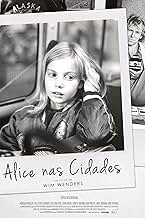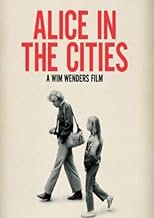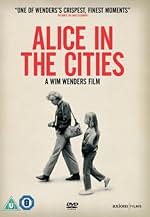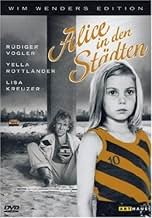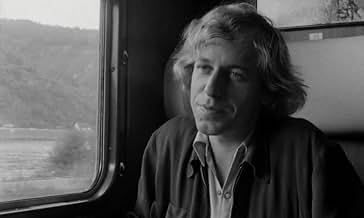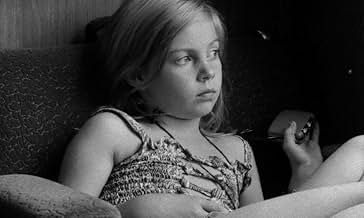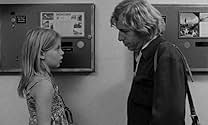अपनी भाषा में प्लॉट जोड़ेंA German journalist is saddled with a nine-year-old girl after encountering her mother at a New York airport.A German journalist is saddled with a nine-year-old girl after encountering her mother at a New York airport.A German journalist is saddled with a nine-year-old girl after encountering her mother at a New York airport.
- निर्देशक
- लेखक
- स्टार
- पुरस्कार
- 1 जीत और कुल 1 नामांकन
- Lisa van Damm
- (as Elisabeth Kreuzer)
- Young Girl on Ferry
- (बिना क्रेडिट के)
- Chuck Berry
- (आर्काइव फ़ूटेज)
- (बिना क्रेडिट के)
- Man Looking at Monitor in New York Airport
- (बिना क्रेडिट के)
- …
- Man at Chuck Berry concert
- (बिना क्रेडिट के)
- Organist at Shea Stadium
- (बिना क्रेडिट के)
- Woman Behind Philip and Alice on Plane
- (बिना क्रेडिट के)
- Man on Empire State Building Roof
- (बिना क्रेडिट के)
फ़ीचर्ड समीक्षाएं
Alice in the Cities marks the first appearance of the director's recurring character Philip Winter (Rüdiger Vogler) who would later reappear in several other Wenders titles. This time he is a journalist and photographer who has been assigned to travel around in the United States and write a story about his experiences but suffers from a bad case of writer's block. Just before returning to his native Germany he meets a German woman called Lisa (Lisa Kreuzer) and her young daughter Alice (Yella Rottländer) who are also planning to return home. Soon Philip finds himself as Alice's temporary custodian and takes her on a long road trip through Germany in order to find her grandmother whose whereabouts seem to be more or less unknown.
Many stories have been made about men learning something new about themselves upon suddenly becoming responsible for a child. The premise can easily be made into a cheesy inspirational family movie, but luckily Alice in the Cities takes a more ambitious, or perhaps ambiguous, route. There are only three significant characters in the story: Philip appears to enjoy living and working alone but gets fairly well along with the young Alice who has also been thrown into the situation against her will but is able to maintain a positive attitude most of the time. The third important figure in the film is Alice's mother Lisa who remains rather enigmatic and does not reveal much about her motives. Philip and Alice do quietly evolve as persons over the course of the story; how exactly, the audience must figure out by themselves.
Visually the movie looks fine. The grainy black and white cinematography is guaranteed Robby Müller quality and the melancholic score is provided by the legendary German krautrock band Can. Numerous shots are filmed through car windows as Philip drives through American or German towns by himself or with Alice, so admirers of urban environments can get a neat first-hand view of a traveler. I especially liked the scenes on or near the suspended monorail in Wuppertal, Germany. Loud TV programs playing in various television sets are also a recurring theme and a source of frustration for Philip, whereas Alice seems to enjoy them more.
There are some things I'm not sure I like, such as the slightly excessive runtime or the frequent fades to black that make many scenes feel a tad rushed, but in the end I enjoyed the movie as a whole. Rüdiger Vogler does a good job as the quiet Philip and Yella Rottländer never comes across as unnatural or annoying in the role of Alice. Alienation, parenthood and traveling are themes that have wide appeal and whilst "the journey is more important than the destination" may not be a wildly original conclusion, it always makes a fitting overhanging theme for a road movie. In addition, Alice in the Cities features a strong thematic connection to Paris, Texas and is recommended viewing to fans of said movie and traveling films in general.
If there are movies, like comedies and horror films, that are better seen in a crowd, there are some movies that might be best seen alone. This is one of them, and I didn't realize until I was almost done because it had become so absorbing I was really enjoying my isolation within the movie.
The plot is simple, and I won't say how it happens, but a nine year old Dutch-German girl is left with a German man in the United States, and he takes care of her as they search for a way to find her mother or grandmother. Their first step is to fly back to Amsterdam, and then in Germany in a little car they poke around looking for her home.
It's a road movie, though unlike any other. The two main characters are about as perfect and as natural as it gets. The man is a thoughtful, drifting writer and photographer, an artist in the counter-culture way of the times. He has no real ambition, but observes the world with poetic appreciation. So when this girl is made part of his life, he takes it in stride. That's key to the mood of the film, that this very unlikely situation can continue for so long because he just goes with the flow. There is no running to the police, no panic. But there is no sense either that this is an accepted new relationship. It's for the moment, but the end of the moment is continually deferred.
The girl goes with the flow as well, and is as brilliant as the man at being natural in front of the camera, often doing nothing. She's made to be lovable, of course, but not in any coy or sentimental way. (If this were a Hollywood film we'd all be barfing by now.) All of this matters because it isn't what's happening that really matters, but it's just being together, the two of them, and then (you realize) the three of you. You wish it was you who was doing this utterly humane, deeply felt act of traveling and being supportive and seeing modern (1973) Germany.
The filming is simple black and white but brilliantly effective, down to the heart wrenching last shot (which was probably the most expensive). The setting is actually a surprise in that you never think of the ordinary middle class and industrial parts of middle Europe being so interesting. The music comes and goes, and refers to the earthy music of the time, mostly American blues based stuff.
In a little way this reminded me of "Stranger than Paradise" and when I connected the two I saw how much Jarmusch (in that film) owed to these art film experiments just a few years earlier. And now that I think of it, this one is more touching and important even if "Stranger than Paradise" is more inventive. "Alice in the Cities" makes a case for a kind of film we don't see being made now, and which might have another vogue one of these years in reaction to the general highly refined, highly artificial worlds of most movies today. I hope so.
A silenced bewilderment has already become routine in the completely paralyzed life of a man, who only pities himself, and who apparently has lost all access to his fellow men. Therefore the girlfriend in New York, to whom he wants to unburden all his world-weariness can do nothing for him but show him the door, saying: "Nobody told me how to live either."
So he forgot how to live, our very typical hero of modern times. But just as in a children's story rescue suddenly appears in the shape of a wondrous fairy, Philip Winters also has a surprising encounter, which will help him to determine his position in this world anew. The unexpected enlightening figure is a child, nine-year-old Alice. Her mother, whose acquaintance Philip had somehow forcibly made at the airport counter, has let her down, leaving behind a succinct message, in which she asks Winters to take provisionally charge of the girl until she will follow them to Amsterdam in a later airplane.
The mother does not appear though, and thus Philip Winters does not have any other alternative but to go on looking after the child, a responsibility he most willingly would like to avoid. But Alice remains persistent, she scents the possibility of an exciting adventure. She mentions a grandmother, who possibly lives in Wuppertal, West Germany. Unwillingly Winters bows to his fate, but after a few abortive attempts he simply deposits her at a police station and goes to a Chuck Berry concert on his own.
That could be the end of the story. But as I already mentioned, Alice is a fairy. And so she does not only come back, but also actually succeeds in getting a mechanism going in Philip Winters which seemed to be already dead and buried: the reference to the other one, the preparedness to get involved with his fellow creatures. At the end of the film he seems to be recovered, the train in which he and Alice are sitting, is obviously moving along on newly built tracks, the decisive switching of the points has been made.
At least for the time being. For it is exactly in this hopeful and promising moment that we have to leave this wonderful movie. We are just allowed to throw another brief glance at the protagonist, who is sitting in the compartment joyfully united with Alice, a moment before the camera steps back and rises into the air, moving irresistibly away from the scene, until it depicts a vast panoramic view. But our eyes are still fixed on the train that hastens steadily through the immense landscape heading towards a destiny unknown.
क्या आपको पता है
- ट्रिवियाThe novel "Tender is the Night" by F. Scott Fitzgerald is seen on the coffee table of Phil Winter's girlfriend. A character in the novel, Rosemary Hoyt, was inspired by Fitzgerald's affair with actress Lois Moran, who appears in this film as an airport hostess. It was Moran's last movie.
- गूफ़Crew are reflected in the side of the car (at around 46 mins - sound man, microphone and other crew. This is why so many cars in movies appear dirty or have a matte paint job.).
- भाव
Lisa - Alice's Mother: What are you writing?
Philip 'Phil' Winter: The inhuman thing about American TV is not so much that they hack everything up with commercials, though that's bad enough, but in the end all programmes become commercials. Commercials for the status quo. Every image radiates the same disgusting and nauseated message. A kind of boastful contempt. Not one image leaves you in peace, they all want something from you.
- कनेक्शनFeatured in Mia toso makryni apousia (1985)
- साउंडट्रैकUnder the Boardwalk
Written by Kenny Young and Arthur Resnick
Performed by The Drifters and The Rolling Stones
टॉप पसंद
- How long is Alice in the Cities?Alexa द्वारा संचालित
विवरण
- रिलीज़ की तारीख़
- कंट्री ऑफ़ ओरिजिन
- भाषाएं
- इस रूप में भी जाना जाता है
- Alice in the Cities
- फ़िल्माने की जगहें
- उत्पादन कंपनियां
- IMDbPro पर और कंपनी क्रेडिट देखें
बॉक्स ऑफ़िस
- बजट
- DEM 5,00,000(अनुमानित)
- दुनिया भर में सकल
- $59,294
- चलने की अवधि
- 1 घं 53 मि(113 min)
- रंग
- ध्वनि मिश्रण


